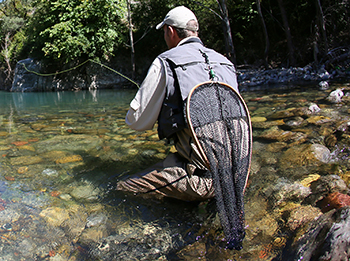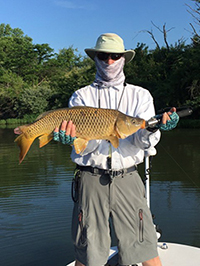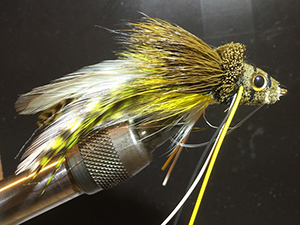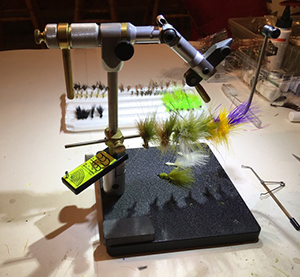Fly Fishing — How to get started right!
 Fly fishing is a form of angling that is both fun and exciting. If you love the idea of traditional fishing but are looking for a more action-oriented activity, fly fishing might just be what you need. Most anglers find that fly fishing is an activity that requires more in-depth research and skill — you will need to master different casting techniques, learn more about local wildlife, and adapt your methods to match your surroundings. Before you get started, here are a few tips:
Fly fishing is a form of angling that is both fun and exciting. If you love the idea of traditional fishing but are looking for a more action-oriented activity, fly fishing might just be what you need. Most anglers find that fly fishing is an activity that requires more in-depth research and skill — you will need to master different casting techniques, learn more about local wildlife, and adapt your methods to match your surroundings. Before you get started, here are a few tips:
- Learn how to cast from a qualified instructor. Good casting is the key to enjoyable and effective fly fishing, and you want to make sure you've got the right technique before you begin perfecting it.
- Determine the most common fish, conditions, and methods you are most likely to encounter.
- Read, watch, and talk with experienced fly fishing anglers about those elements.
- Realistically assess your budget.
- Go to a dedicated fly shop. Tell them about your expected fishing circumstances. The staff will help you find the right stuff for you. Ask to cast the rods they’ve suggested. If they don’t allow casting the rods, you’re in the wrong shop. Try it before you buy it.
A note about the cost of flyfishing: With most freshwater fly fishing, you put your money into the rod, the line, and the reel, in that order. With saltwater, or freshwater big game fish, expect the costs to go up. As a beginner, there’s no need to spend thousands of dollars on a new setup to get started. All that is needed is a fly rod and reel, fly line, leader, and a basic selection of flies. Once you get the hang of things, you can begin looking into higher-quality tools to help you capture different fish species.
What fish do Illinois fly fishers catch?
 In Illinois you can find a wide variety of sportfish, including bass, panfish, muskie, pike, carp, buffalo, and trout. Up in Lake Michigan, you can add salmon and steelhead to that list.
In Illinois you can find a wide variety of sportfish, including bass, panfish, muskie, pike, carp, buffalo, and trout. Up in Lake Michigan, you can add salmon and steelhead to that list.
Who can fly fish?
While we recommend beginners start at age 14 and over, there are accomplished fly fishers who are younger and many who fly fish well into their nineties. It's less about age and more about the ability to cast correctly as casting ability is the key to successful and enjoyable fly fishing. Good form is more important than brute strength. Men and women both enjoy the sport.
Where can I fly fish?
The better question is: Where can't I fly fish? You can fly fish in still water, flowing water, warm water, cold water, freshwater, saltwater. You can fish the surface, down to about 30 feet. You can fish from a bank, a boat, or waders, or wade wet. Better yet, you don't even need water to practice casting.
Do I have to know the Latin names of all the insects and bait fish?
No, the fish don't either. What's more important is familiarizing yourself with what type of prey the fish seeks.
What's different about fly fishing?
In fly fishing, the weight of the line is what carries out the fly, not a heavy lure pulling out the line. Fly fishing requires the angler to use the bend of the rod and the back-and-forth loop of the line in the air to propel the fly to the desired spot. When done by a practiced fly fish angler, the loop of the line created by the backward and forward casting motion is a thing of beauty. It is also a lot of fun and a skill that one never fully masters, but can always improve. Here are some of the advantages of fly fishing:
- Fish open water pockets of weeds or brush without dragging through debris on the way out.
- Fish around and behind stumps, rocks, and trees.
- Drop the fly close to the fish without spooking it.
- Pick up the fly and recast to another target without reeling in the line.
- Fish multiple flies at the same time.
- Easily walk about carrying just a rod and a few flies.
- Quickly remove the fly from a fish, your clothes, and even yourself. Great for catch and release.
 Do I have to learn to tie flies?
Do I have to learn to tie flies?
Not at all — flies are readily available for purchase, as is information on their selection. In the beginning, a few flies matched to your most frequently targeted fish will do nicely. However, tying flies is fun to do and rewarding to fool a fish with something you have made yourself.
 The advantage of learning to tie flies:
The advantage of learning to tie flies:
- You can repair, replace, or revise the flies you have.
- It’s fun to imagine, create, and tie new flies.
- It’s a great a great fishing-related activity during winters when weather is prohibitive to open-water fishing.
- You may find yourself more willing to risk putting the flies in harm's way, where the fish hang out.
- It’s nice to trade or give a fly you have made to another angler.
- It’s even better to share what you have learned with friends and family.
Why should I try fly fishing?
The main reason you should give fly fishing a try is that it is fun! Whether you are fishing alone, or with friends, fly fishing is offers all the elements of outdoor recreation: it's exciting, frustrating, satisfying, and rewarding. It can offer you solitude in a quiet, untouched, unpopulated areas of the wild, or it can be a social activity with a group of friends. The moment when a targeted fish sucks your fly into its mouth and you feel the line tense beneath your fingers is indescribable, you will be hooked.



